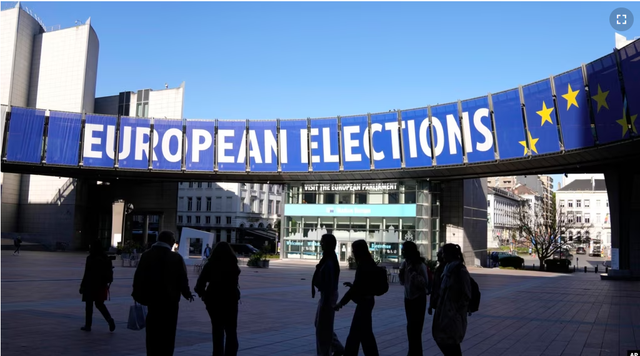
 Flash News
Flash News
EU elections, analysts: Results negative warning for European integration, Kosovo-Serbia dialogue

The elections for the European Parliament, which highlighted an increased influence of right-wing parties in Europe, according to analysts interviewed by the Voice of America, are not a good warning for the European integration process of the Western Balkan countries and for the dialogue between Kosovo and Serbia.
The professor of political science at the University of Rome Federiga Bindi and the analyst of the European Council for Foreign Relations, Maria Simoenova told the journalist Garentina Kraja that the elections revealed a gloomy picture in Europe under the shadow of the war in Ukraine, which according to them will continue to remain the main concern of the European bloc, which is currently facing a financial crisis and the incited anti-immigration rhetoric.
The Western Balkans will be the main loser of the new political reality in Europe, emerging from the European parliamentary elections according to analysts.
The European elections, which were held from June 6 to 9, saw a marked increase in right-wing parties, although the main pro-European parties maintained their lead.
Analysts estimate that one of the first impacts is expected to be on the enlargement policy.
The professor of political science at the University of Rome and the University of Boulder in Colorado, Federiga Bindi, says that the integration of the Western Balkans has not been a priority of the European Union's policies for almost a decade and that this European orientation, which she calls "short-sighted", will continue to accompany the region during the next five years of the mandate of the 720 new members of the European Parliament.
"The countries of the Western Balkans are the big losers in this whole situation, especially because of the war in Ukraine. The European Union's efforts to integrate them have diminished... During the last eight years, there is no more talk about the Balkans, although there is enough evidence that the EU can bring about change in this region. The influence of the EU is visible not only in Slovenia and Croatia, but also in other parts of the Western Balkans, in Bosnia or Albania and in other countries, it can be seen how much effort these countries have made to become member of the EU and the fact that the European Union does not respond and gives priority to other countries, such as Ukraine, is frankly unfair and also short-sighted... Europeans are completely confused by Ukraine and have lost perspective on everything else ".
The expert of the European Council on Foreign Relations, Maria Simeonova, says that although right-wing parties increased their presence in all 27 states of the European Union, the results in France and Germany were the most shocking, shaking the position of the leaders of the two main states of the bloc. , who had a greater commitment to the Balkans.
"France and Germany are major players in the region and as the two largest member states, they play an essential role in the processes in the Balkans, in particular in Bosnia and Herzegovina and in the dialogue process between Kosovo and Serbia... Therefore, there will be negative effect on the new initiatives for the Western Balkans, since President Macron and Chancellor Scholz have weakened a lot in their countries".
Analyst Simeonova says that the results of the elections will also "complicate the process of enlargement" of the European Union with the states of the region and the weakening of efforts to engage with Kosovo and Serbia to advance the normalization process.
"It will be more difficult for the European Union, taking into account the election results, to reach a consensus on enlargement. This does not necessarily mean that there will be no political will, or that concrete steps will not be taken. But I think that the greater presence of right-wing parties in the parliament enables them to restrain some of the boldest initiatives that should be made in relation to the Western Balkans".
Professor Bindi says that the lack of attention of the European Union has left behind a fragile situation, including in the dialogue between Kosovo and Serbia, where the bloc has a weighty role as a mediating party to reach a normalization agreement between the two countries, which according to her, was left behind because of the war in Ukraine.
"What will the European Union be able to offer these countries to achieve peace? When (former EU High Representative for Foreign Affairs and Security Policy Catherine) Ashton negotiated the deal, we had something to offer, but now it is clear that membership is a long-term goal. We have nothing to offer and this situation does not help".
Mrs. Bindi says that the lack of attention of the EU and the United States in the Western Balkans has created space for other powers in the region.
"Foreign policy is like physics. When there is a void, it tends to fill. There are regional and international actors who are interested in filling this gap. Russia with the entire Serbian side, China is everywhere, then Turkey among the Muslims and the Gulf states, which have invested in Bosnia and Albania. Therefore (the EU) is losing the opportunity in its own backyard, in a region that needs to be taken care of more".
Analysts say that the American presidential elections, held in November, will have a special role in the dynamics of developments in the region in the coming months, which, according to them, can also determine the speed of actions of European leaders in the Western Balkans. VOA
Latest news


Fiscal peace, but at a cost
2025-07-05 18:00:10
'Bankers' tax evasion, Chinese CEO and former director jailed
2025-07-05 17:39:21
Kyle Walker joins English club on two-year deal
2025-07-05 17:20:24
Two cars collide on the Saranda-Delvina axis, 4 injured
2025-07-05 17:05:29
Touching gesture! Liverpool will pay Jota's family's salary until 2027
2025-07-05 16:45:18
The zodiac signs that cheat most often
2025-07-05 16:25:53

"I asked for the dismissals", Dredha tries to soften Rama's 'blow' in Vlora
2025-07-05 15:48:49
Bomb threat in Parliament, prosecutor: It was a lie
2025-07-05 15:22:28

Bardhi: The recount revealed how greedy Zeqine Balluku is in stealing
2025-07-05 14:44:29
Knife wound on the secondary road Tirana-Durrës, perpetrator sought
2025-07-05 14:37:54
Tears and pain, Diogo Jota is escorted to his final home
2025-07-05 14:21:34
Success starts with yourself! Simple ways to invest in personal development
2025-07-05 13:58:50
Unlicensed firearms found in apartment, 50-year-old arrested in Lushnje
2025-07-05 13:43:11

Tirana Court remands Skerdi Sina to prison
2025-07-05 12:59:34
Cocaine laboratory in Greece, here are the Albanians arrested and wanted
2025-07-05 12:40:16
Directed Justice/Vangjeli: SPAK does not investigate any scandal involving Rama
2025-07-05 12:22:03

Bomb alert, Police remove MPs and media from Kosovo Parliament building
2025-07-05 11:48:16
"The will of the people" and the irony of ordered resignations
2025-07-05 11:32:05
Summer drowning risk: How to enjoy the water without risking your life
2025-07-05 11:20:27
Fire situation in the country, 16 fires reported in 24 hours, 4 still active
2025-07-05 11:07:04
Car hits pedestrian at white lines, injured in serious condition in Vlora
2025-07-05 10:59:58
Mosquito-borne diseases are a growing problem in Europe
2025-07-05 10:44:13



One of Sweden's most dangerous and wanted criminals arrested in Turkey
2025-07-05 09:38:29
Foreign exchange/ How much foreign currencies are bought and sold today
2025-07-05 09:18:38

"Don't be influenced by the opinions of others", today's horoscope
2025-07-05 08:40:50

Morning Post/ In 2 lines: What mattered yesterday in Albania
2025-07-05 08:02:07

Trump says he's ready to raise tariffs to 70% on some countries
2025-07-04 22:35:52
Tre shenjat e zodiakut që do ‘pasurohen’ në Korrik
2025-07-04 22:05:09
Gaza War: Hamas Accepts US Proposal for 60-Day Ceasefire
2025-07-04 21:50:10
Autocracy in Albania, Fuga: Governance has gotten out of control
2025-07-04 21:40:51
Meta: Agriculture on credit, the new fraud!
2025-07-04 21:26:39




Vote recount in Durrës ends without changes
2025-07-04 20:12:54
Gas station explodes in Rome, 25 injured (VIDEO)
2025-07-04 20:00:20

These afternoon habits often sabotage weight loss
2025-07-04 19:39:28
Former Arsenal player Thomas Partey accused of rape
2025-07-04 19:24:21
Shepherd disappears without a trace in Delvina
2025-07-04 19:14:31

Bardho gave Zegjine's mandate/Braho: Unfair! It violates the electoral system
2025-07-04 19:01:08


Rapid developments in the Sultanates!
2025-07-04 18:00:06



Italy tightens rules for skateboard traffic
2025-07-04 17:20:18

Unusual for the time, dense fog covers the coast of Vlora
2025-07-04 16:48:01


Accident on the Shkodra-Lezhë axis, one dead and 3 injured
2025-07-04 16:14:19
Albania with fewer requests for asylum and Albanian citizenship in 2024
2025-07-04 16:06:57

Albania last for quality of life, DP: Technical government is the solution!
2025-07-04 15:42:30
Nico Williams says "No" to Barcelona, signs with Athletic Club until 2035
2025-07-04 15:33:35
Fires in the country, four fires are still active, what is the situation?
2025-07-04 15:24:20

Summer brings big changes for these 4 zodiac signs
2025-07-04 15:00:04
Osmani: MPs need to agree to a secret ballot for the Speaker of Parliament
2025-07-04 14:51:09
Serious accident on the Peqin-Elbasan axis, two injured
2025-07-04 14:37:56

GJKKO leaves in force the security measure for the head of the KPP
2025-07-04 13:58:17
Who will replace Ilir Meta and take over the leadership of the PL?
2025-07-04 13:50:36
Berisha: Dismissal of directors in Vlora, another act of 'scapegoats'
2025-07-04 13:41:46




Librazhd/ In a serious psychological state, the young man consumes pesticides
2025-07-04 13:05:07


Weapons trafficked from Kosovo to Albania, two arrested, 8 pistols seized
2025-07-04 12:33:28
Konsumimi i tepërt i çokollatës, ja cilat janë dëmet që shkakton në organizëm
2025-07-04 12:23:35

Fires in the country, 21 fires in the last 24 hours, 4 still active
2025-07-04 12:00:19
WB calls for debt transparency: Albania to publish details of every loan
2025-07-04 11:50:05
Changes in the State Police, new names expected to lead 5 police stations
2025-07-04 11:40:06

The race for the head of the BKH, the third phase on July 11
2025-07-04 11:20:23

Toxic phrases that show your relationship is in trouble
2025-07-04 11:00:10

2 brothers arrested in Roskovec, cultivating narcotic plants
2025-07-04 10:38:08

